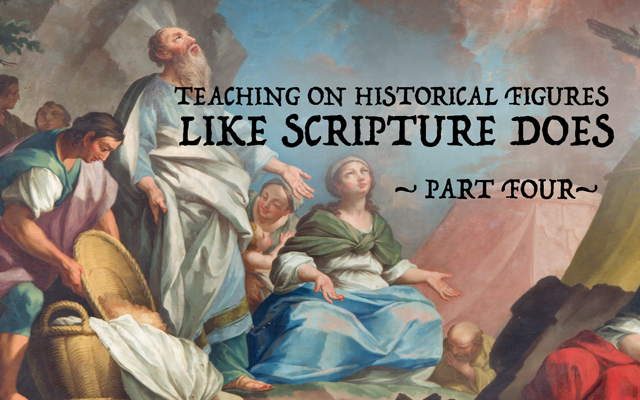Teaching on Historical Figures Like Scripture Does – Part Four


In closing our case study on the life of Moses, one final analysis remains: what was the impact of his life on history, and how are we to remember him? As you can probably guess, the Bible gives us a pattern for how we can accurately and truthfully judge the merits and follies of imperfect men and women.
Reaching a Verdict on Moses
Because Moses was such a major biblical figure, there is a great deal that the Lord says about his life in the remaining narrative of the Bible.
First, God confirmed that He had, indeed, been with Moses, so much so that it was His promise of encouragement to Moses’ predecessor, Joshua:
There shall not any man be able to stand before thee all the days of thy life: as I was with Moses, so I will be with thee: I will not fail thee, nor forsake thee” (Joshua 1:5).
God also recognizes many of Moses’ accomplishments, such as:
Conquest
“Your wives, your little ones, and your cattle, shall remain in the land which Moses gave you on this side Jordan; but ye shall pass before your brethren armed, all the mighty men of valour, and help them…” (Joshua 1:14)
Obedient Servant
“As the LORD commanded Moses his servant, so did Moses command Joshua, and so did Joshua; he left nothing undone of all that the LORD commanded Moses” (Joshua 11:15).
Law-giver
“But take diligent heed to do the commandment and the law, which Moses the servant of the LORD charged you, to love the LORD your God, and to walk in all his ways, and to keep his commandments, and to cleave unto him, and to serve him with all your heart and with all your soul” (Joshua 22:5).
Type of Christ
“For Moses truly said unto the fathers, A prophet shall the Lord your God raise up unto you of your brethren, like unto me; him shall ye hear in all things whatsoever he shall say unto you” (Acts 3:22).
Faithful
“And Moses verily was faithful in all his house, as a servant, for a testimony of those things which were to be spoken after…” (Hebrews 3:5)
“By faith Moses, when he was come to years, refused to be called the son of Pharaoh’s daughter…” (Hebrews 11:24)
What better testimony could one receive? Though imperfect, God fully acknowledged the deeds of Moses as a man who was full of faith, and faithful before God in his role in history. In like manner, our appraisal of all historical figures should be how faithful they were to God’s Word. As a king, did they rule justly and benevolently? As explorers, were they honest and harmless? As writers, artists, musicians, and sculptors, did the form, as well as the content, of their masterpieces extol the beauty of holiness? In the day when every knee shall bow to history’s Author, a final verdict on their works will be handed down, judged by the pure Word of God. Until then, may our summation of a person’s life be formed by “whatsoever things are true, lovely, and good…” (Philippians 4:8), just like Scripture does.
Kenzi Knapp is a follower of Christ, homeschool graduate and student of history. A fourth generation Missourian she enjoys writing about daily life enrolled in Gods great course of faith and His story throughout the ages at her blog, Honey Rock Hills.










































